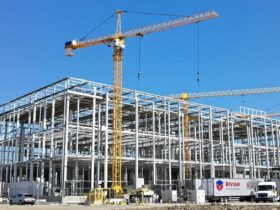Ford Motor Company has issued a warning to its dealers about potential price increases on new vehicles due to the ongoing tariffs imposed by the Trump administration. The automaker is currently offering significant discounts but may need to adjust prices for models produced starting in May if the tariffs remain in effect.
Key Takeaways
- Ford may raise prices on new vehicles if tariffs persist.
- Current inventory prices will not change until June 2.
- The company is offering steep discounts through early June.
- Approximately 80% of Ford’s vehicles sold in the U.S. are produced domestically.
Background on Tariffs
The automotive industry has been significantly impacted by tariffs, particularly the 25% duties on imported vehicles and parts. These tariffs, which took effect earlier this month, have raised concerns among automakers about increased production costs and the potential need to pass these costs onto consumers.
President Trump has expressed mixed messages regarding the tariffs, suggesting they are beneficial for domestic manufacturing while also indicating he might consider exemptions for the auto industry. This uncertainty has left automakers like Ford in a precarious position as they navigate pricing strategies.
Ford’s Current Strategy
In a memo to dealers, Ford’s executive Andrew Frick stated that while the company is committed to not raising prices on existing inventory, adjustments may be necessary for vehicles produced in May and beyond. The memo highlighted the following points:
- Discounts Available: Ford is currently running a promotion offering employee pricing to customers, which will last until June 2.
- Inventory Management: Ford has sufficient inventory to meet customer demand through the promotion period, with no immediate price increases on current stock.
- Future Pricing Adjustments: If tariffs remain unchanged, new models arriving in late June or early July could see price hikes ranging from $5,000 to $15,000.
Implications for Consumers
Consumers looking to purchase a Ford vehicle this summer may face higher prices if the tariffs continue. The company has reassured customers that any price increases will not affect vehicles already in inventory, but new models could be significantly more expensive.
Market Reactions
The automotive market is reacting to these tariff concerns with various strategies:
- Discount Offers: Many automakers are providing discounts to alleviate consumer fears about rising prices.
- Inventory Management: Some companies are holding back inventory to avoid incurring tariff costs on vehicles that have not yet been sold.
- Consumer Sentiment: Despite the tariff situation, dealers report strong sales, indicating that consumer demand remains robust for the time being.
Conclusion
As Ford navigates the complexities of the current tariff landscape, consumers and dealers alike are left to ponder the potential impact on vehicle pricing. With the deadline for current discounts approaching, the next few months will be critical for both Ford and its customers as they adapt to the evolving economic environment.













Leave a Reply